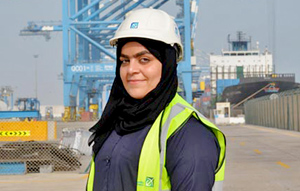Dubai, Jan 29: Aisha Al Marzouqi is the UAE’s first woman to work as a crane operator at Khalifa Port in Abu Dhabi.
Aisha, a 28 year-old Emirati, operates one of the port’s super-post-Panamax cranes weighing 1,932 tonnes with a height of 126.5 metres. Her main job is to unload container vessels using the crane which has a lifting capacity of 90 tonnes.
Aisha is currently in the final phase of her training programme and will be working independently on site upon completion of training. Unlike other occupations, Aisha’s workplace does not consist of a desk and computer, but rather a glass cabin with the necessary controls of the crane overlooking the vessels beneath her feet.
“As part of my job, there are challenges like getting on the crane in the first place,” she said. “However I love the job. It requires a lot of attention and focus because you are operating something that is big in size and carries heavy containers.”
She explained that she got the job through a recruitment event held for UAE nationals, when she heard Mohammad Al Shamsi speak about the shortage of Emirati employees in the workforce.
Aisha was looking forward to being the first Emirati woman to occupy this position, setting an example in her society.
“I watched a documentary about a female pilot in the UAE Air Force who truly inspired me. Before I started my training at Khalifa Port container terminal, I was given a tour of the port facilities and the ship-to-shore quay cranes really fascinated me. I felt this was my calling and I decided to become a crane operator,” she said.
Working five days a week, her shifts consist of four hours from 8am to 4pm. Aisha followed her ambitions with family and friends constantly commending her decision.
“They all encouraged me and blessed my decision and now I am named the first Emirati woman to become a crane operator,” she said.
Abu Dhabi Terminal has employment and training initiatives to boost its Emiratisation strategy.







.jpg)
.jpg)
Comments
Add new comment